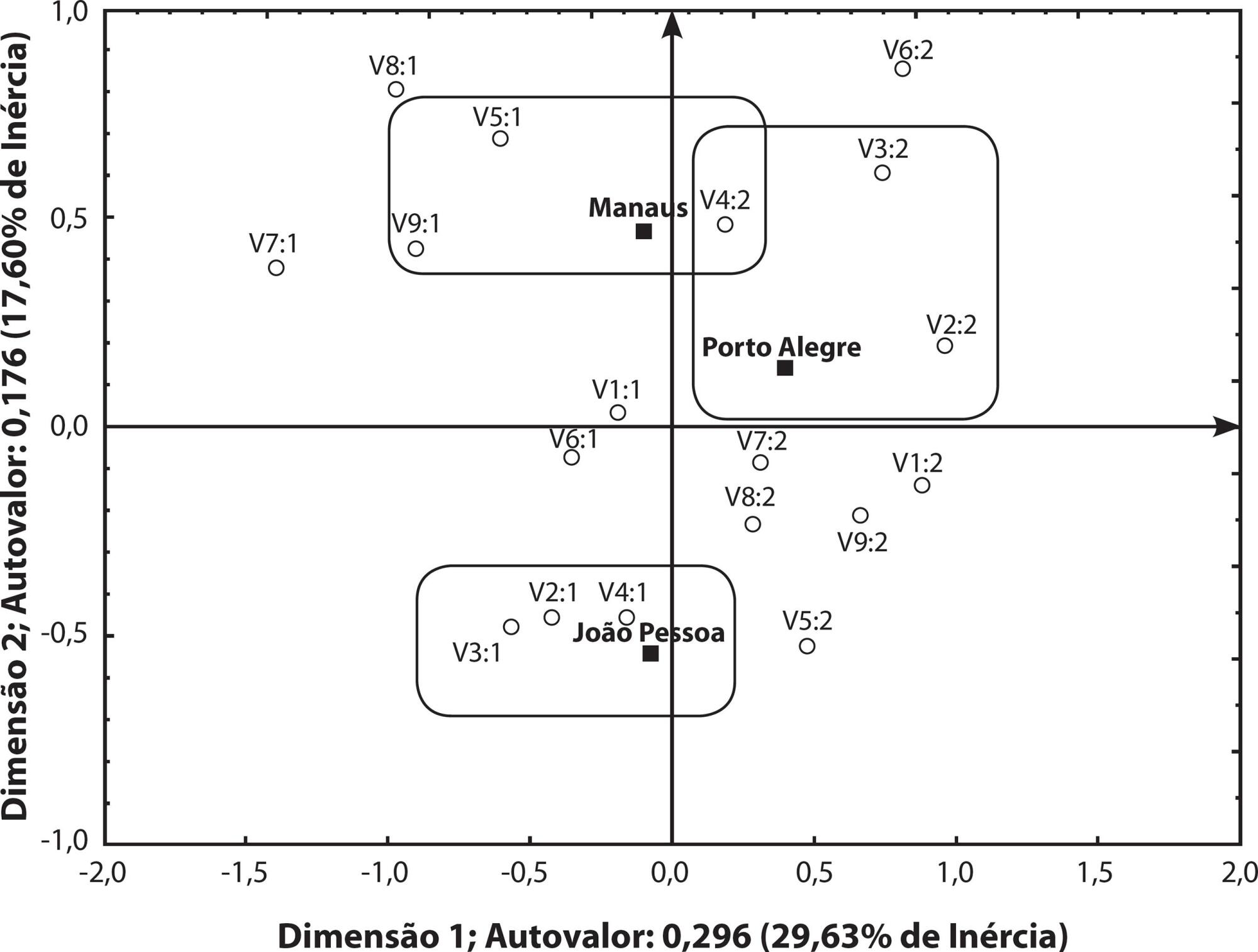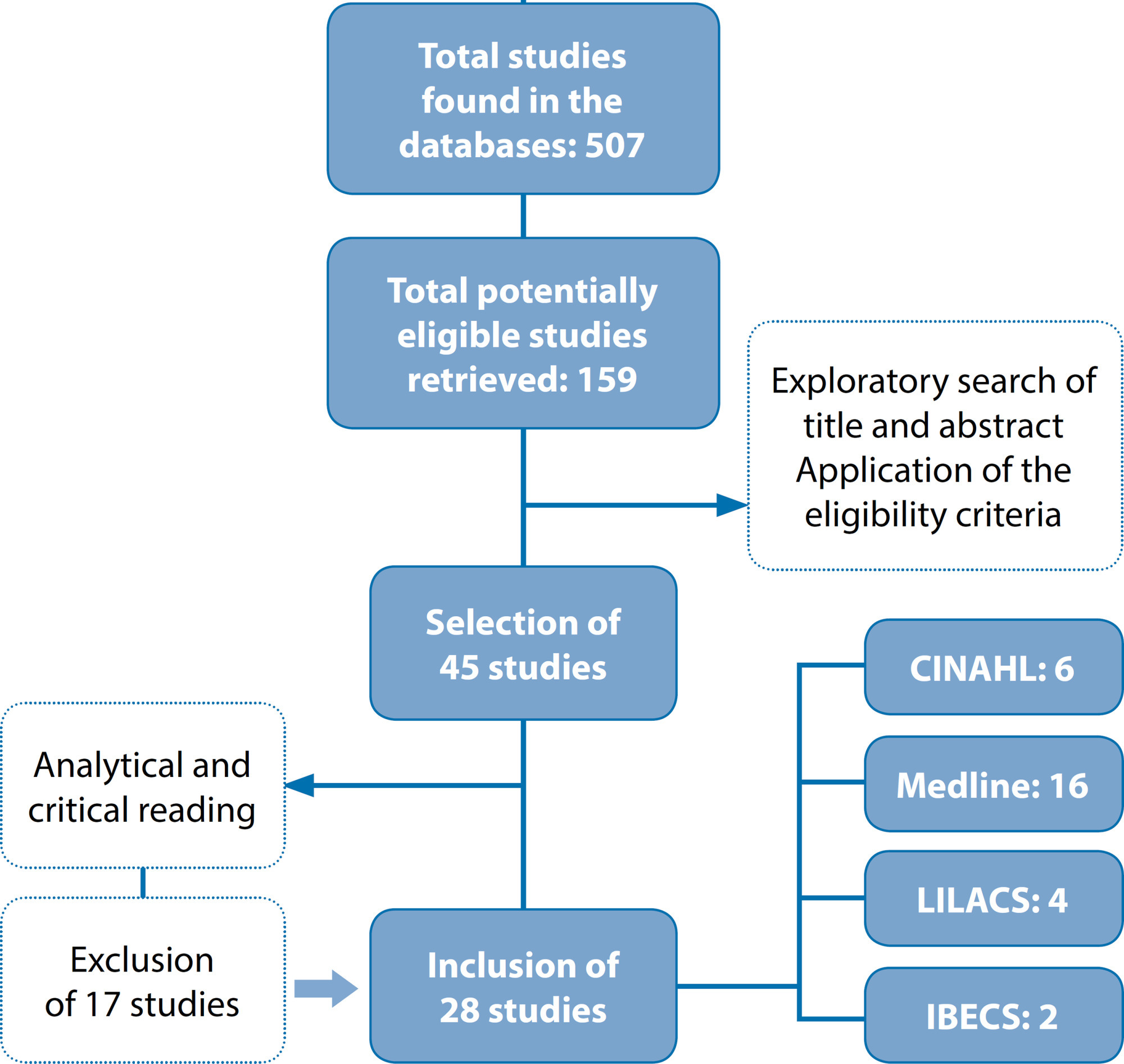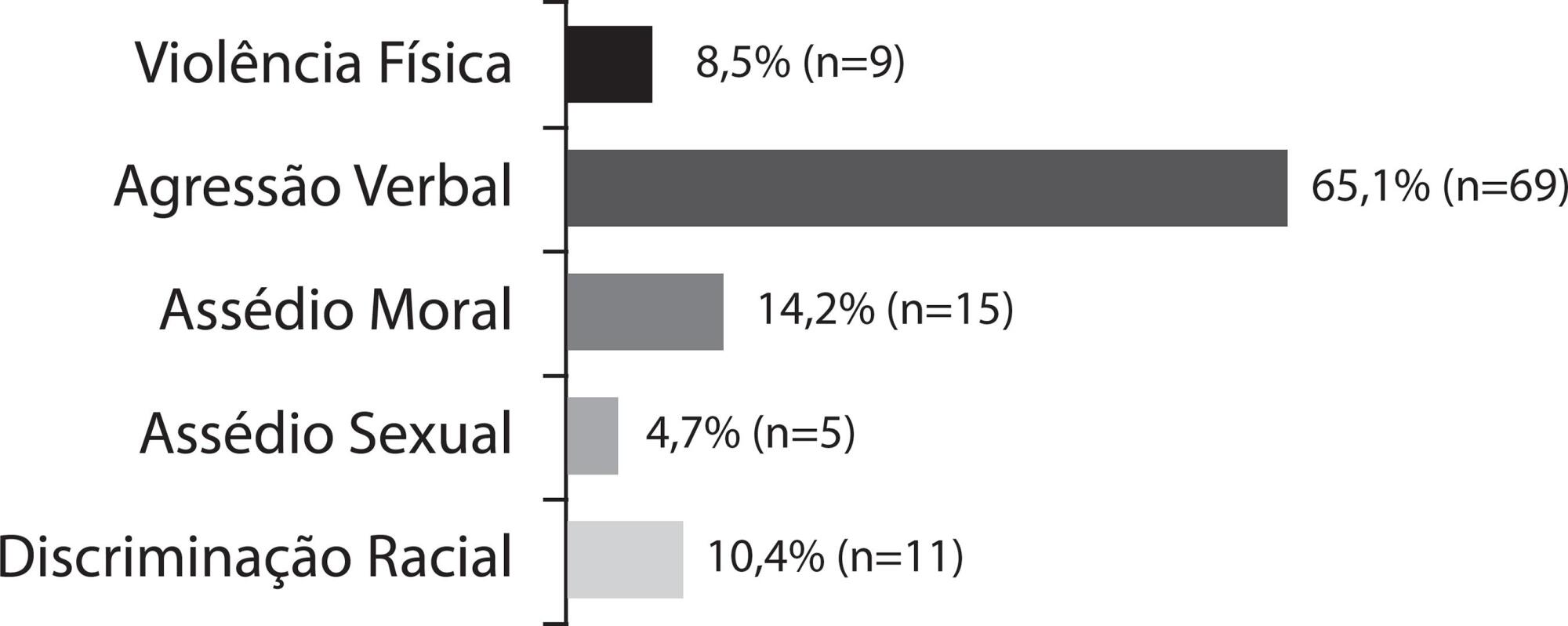-
ARTÍCULO ORIGINAL16/12/2024
Respectful care for postpartum women with sickle cell disease: a netnographic study
Revista Brasileira de Enfermagem. 2024;77(6):e20230545
Resumen
ARTÍCULO ORIGINALRespectful care for postpartum women with sickle cell disease: a netnographic study
Revista Brasileira de Enfermagem. 2024;77(6):e20230545
DOI 10.1590/0034-7167-2023-0545
Visualizações1Ver maisABSTRACT
Objectives:
to analyze principles of respectful maternity care in narratives of postpartum women with sickle cell disease, relating them to Sustainable Development Goals.
Methods:
netnographic study, with two videos published in 2020. Deductive iconographic and thematic analysis by Respectful Maternity Care Charter, organized in MAXQDA.
Results:
principles identified were the right to: freedom from harm and ill-treatment; information, informed consent, refusal of medical procedures, and respect for their choices and preferences including companion; be considered a person from birth, with dignified and respectful treatment; health at the highest possible level; newborns being with their parents or guardians. The Sustainable Development Goals for women by 2030 were not positively contemplated in postpartum women’s experience.
Final Considerations:
it is appropriate that health workers qualify themselves to provide respectful maternity care, with qualified listening, understanding, and resolution of unique demands of postpartum women with sickle cell disease, seeking equality in care for women.

-
16/12/2024
GerenciaDOR™: development of digital technology by nurses for the assessment of patients with chronic pain
Revista Brasileira de Enfermagem. 2024;77(6):e20240050
Resumen
GerenciaDOR™: development of digital technology by nurses for the assessment of patients with chronic pain
Revista Brasileira de Enfermagem. 2024;77(6):e20240050
DOI 10.1590/0034-7167-2024-0050
Visualizações0Ver maisABSTRACT
Objectives:
to develop a digital technological solution (prototype) for assessing patients with chronic pain.
Methods:
this is a methodological and technological development study based on the Human-Centered Design framework and the principles of Patient-Centered Care. The prototype guides patients through a body diagram and directs them to an evaluation using specific instruments that address the multidimensional aspects of chronic pain.
Results:
the GerenciaDOR* project enables navigation through the Web App screens, providing access to pain assessment features up to the presentation of results.
Final Considerations:
the study describes a systematic approach to pain assessment and expands nurses’ knowledge in pain management. Additionally, it can promote the development of other digital technologies for chronic pain assessment and contribute to a multidisciplinary, patient centered treatment.

-
ARTÍCULO ORIGINAL16/12/2024
Psychometric analysis of ProQOL-BR in nursing: building hospital safety and protection
Revista Brasileira de Enfermagem. 2024;77(6):e20240085
Resumen
ARTÍCULO ORIGINALPsychometric analysis of ProQOL-BR in nursing: building hospital safety and protection
Revista Brasileira de Enfermagem. 2024;77(6):e20240085
DOI 10.1590/0034-7167-2024-0085
Visualizações0Ver maisABSTRACT
Objectives:
to analyze the psychometric properties of the ProQOL-BR instrument in hospital nursing professionals.
Methods:
a methodological study to validate the ProQOL-BR. Confirmatory factor analysis, assessment of local and global adjustment quality, Pearson hypothesis testing and Cronbach’s alpha internal consistency analysis were used.
Results:
a total of 490 professionals participated. The model presents adequate quality due to factor weights (λ≥ 0.40), acceptable overall fit quality and adequate chi-square ratio and degrees of freedom (χ2/g.1=2.51) for the parameters of CFI (0.923), GFI (0.902), TLI (0.914) and RMSEA (0.042). In terms of validity, it was shown to be adequate with CC=0.89. The internal consistency obtained by standardized Cronbach’s alpha was 0.761. Criterion validity was shown to be favorable with significant correlations (0.001).
Conclusions:
the instrument was validated regarding content, criteria and reliability. Three questions were removed from the original instrument, ProQOL-BR, leaving the final instrument with 25 questions.

-
ARTÍCULO DE REVISIÓN16/12/2024
Recommendations for guidelines for promoting mental health in the workplace: an umbrella review
Revista Brasileira de Enfermagem. 2024;77(6):e20240086
Resumen
ARTÍCULO DE REVISIÓNRecommendations for guidelines for promoting mental health in the workplace: an umbrella review
Revista Brasileira de Enfermagem. 2024;77(6):e20240086
DOI 10.1590/0034-7167-2024-0086
Visualizações1Ver maisABSTRACT
Objectives:
to summarize the recommendations of guidelines for promoting mental health in the workplace.
Methods:
an umbrella review, according to Joanna Briggs Institute and Preferred Reporting Items for Systematic reviews and Meta-Analyses methodological assumptions. Data collection was carried out in January 2021 and updated in July 2023 in the American Psychological Association, Cochrane Library, EMBASE, National Library of Medicine, and Scopus databases. Systematic reviews that assessed guidelines with recommendations for mental health care for workers were included. PROSPERO registration CRD42023461845.
Results:
four systematic reviews published between 2015 and 2018 were identified. The abstracts highlighted actions that facilitate and inhibit the recommendations as well as three categories of intervention: primary prevention – worker protection; secondary prevention – promoting workers’ mental health; and tertiary prevention – supporting, monitoring and rehabilitating workers upon returning to work.
Conclusions:
the interventions are based on prevention, promotion and early recognition, support and rehabilitation of mental health problems.

-
ARTÍCULO ORIGINAL16/12/2024
Analysis of omission of antimicrobial doses in Intensive Care Units
Revista Brasileira de Enfermagem. 2024;77(6):e20240102
Resumen
ARTÍCULO ORIGINALAnalysis of omission of antimicrobial doses in Intensive Care Units
Revista Brasileira de Enfermagem. 2024;77(6):e20240102
DOI 10.1590/0034-7167-2024-0102
Visualizações0Ver maisABSTRACT
Objectives:
to analyze the rate of antimicrobial dose omission in intensive care units.
Methods:
cross-sectional study carried out between March 1 and September 30, 2023, in intensive care units of a University Hospital in Rio de Janeiro.
Results:
the sample consisted of 452 prescriptions and 1467 antimicrobial doses. The dose omission rate was 4.29%. Each antimicrobial prescribed increased the chance of omission by 51%. The strategy of double-checking prescriptions helped prevent 30% of antimicrobial dose omissions (p=0.0001).
Conclusions:
monitoring the omission of antimicrobial doses can guide nursing actions to improve quality and patient safety, contributing to the prevention of medication errors, antimicrobial stewardship and the fight against antimicrobial resistance.
-
ARTÍCULO ORIGINAL16/12/2024
Health literacy development of Primary Health Care patients: qualitative research
Revista Brasileira de Enfermagem. 2024;77(6):e20240154
Resumen
ARTÍCULO ORIGINALHealth literacy development of Primary Health Care patients: qualitative research
Revista Brasileira de Enfermagem. 2024;77(6):e20240154
DOI 10.1590/0034-7167-2024-0154
Visualizações0Ver maisABSTRACT
Objectives:
to identify the process of health literacy development among primary care patients, relating it to their self-care practices.
Methods:
qualitative, prospective research with 22 patients from two Family Health Strategy units. Data were obtained through individual semi-structured interviews, examined through descriptive statistics and thematic content analysis.
Results:
the results discuss how participants learn about health and how this resonates in their behaviors, culminating in two thematic categories: “Health knowledge construction”; and “Dialogue between health knowledge construction and patient care actions”.
Final Considerations:
health knowledge is developed mainly through interpersonal relationships, mediated by health professionals through bonding and communication. Community educational actions and training of health professionals in communication can promote health literacy and self-care among patients.

-
ARTÍCULO ORIGINAL16/12/2024
Bladder ultrasound: evidence of content validity of a checklist for training nurses
Revista Brasileira de Enfermagem. 2024;77(6):e20230183
Resumen
ARTÍCULO ORIGINALBladder ultrasound: evidence of content validity of a checklist for training nurses
Revista Brasileira de Enfermagem. 2024;77(6):e20230183
DOI 10.1590/0034-7167-2023-0183
Visualizações0Ver maisABSTRACT
Objectives:
to develop and analyze evidence of content validity of a checklist for training nurses in measuring bladder volume through ultrasound.
Methods:
a methodological study, consisting of three stages: literature review; instrument item preparation; and analysis of evidence of content validity. The Content Validity Index (CVI) and Gwet’s AC2 were used for content validity analyses.
Results:
the checklist consisted of 23 items. The CVIs for clarity, relevance and dimensionality were 0.99, 0.99 and 0.98 respectively, and the CVIs for Gwet’s AC2 with coefficients for clarity, relevance and dimensionality were 0.89, 0.97 and 0.95, respectively, with p<0.001.
Conclusions:
the checklist developed for training nurses in measuring bladder volume through ultrasound achieved adequate evidence of content validity, and can be used to train nurses in clinical practice and future research.

-
16/12/2024
A relação entre gênero, formação educacional e ambiente de aprendizagem com a ansiedade do estudante de enfermagem
Revista Brasileira de Enfermagem. 2024;77(6):e20220615
Resumen
A relação entre gênero, formação educacional e ambiente de aprendizagem com a ansiedade do estudante de enfermagem
Revista Brasileira de Enfermagem. 2024;77(6):e20220615
DOI 10.1590/0034-7167-2022-0615
Visualizações1Ver maisRESUMEN
Objetivos:
identificar las variables asociadas a la práctica clínica relacionadas con la ansiedad de los estudiantes de enfermería.
Métodos:
se utilizó un diseño descriptivo, cuantitativo, correlacional con las recomendaciones STROBE, EQUATOR. La población fue de 233 estudiantes de enfermería con una muestra de 135 personas. Los datos se recopilaron de marzo a abril de 2022 utilizando instrumentos validados.
Resultados:
la prueba de chi-cuadrado y razón de verosimilitud significativa para género, formación académica y entorno de aprendizaje son superiores a 0.05, por lo que no existe una relación significativa entre las variables y la ansiedad de los estudiantes.
Conclusiones:
los estudiantes necesitan prepararse nuevamente antes de ingresar al campo de la práctica. Investigaciones cualitativas también son necesarias.
-
16/09/2019
Práticas de enfermagem centradas no indivíduo com tuberculose: interface com a democracia
Revista Brasileira de Enfermagem. 2019;72(5):1219-1225
Resumen
Práticas de enfermagem centradas no indivíduo com tuberculose: interface com a democracia
Revista Brasileira de Enfermagem. 2019;72(5):1219-1225
DOI 10.1590/0034-7167-2017-0380
Visualizações0Ver maisRESUMO
Objetivo:
Analisar se as práticas de enfermagem centradas no usuário em Tratamento Diretamente Observado da tuberculose estão sendo desenvolvidas e se estão contribuindo para a democracia.
Método:
Estudo descritivo e exploratório, de corte transversal, realizado com 123 enfermeiros em três capitais brasileiras com alta incidência de tuberculose. Os dados foram coletados no período de janeiro a junho de 2014 e analisados mediante análises descritiva e de correspondência múltipla.
Resultados:
A maioria das ações de cuidado centrado no usuário apresentou escores abaixo de 50%, considerados desfavoráveis ao exercício da democracia. Na análise do escore geral das práticas centradas no usuário por município, Manaus e João Pessoa apresentaram resultados desfavoráveis, e Porto Alegre, parcialmente favoráveis.
Conclusão:
As três capitais precisam avançar na realização de práticas centradas no usuário submetido a este tipo de tratamento, pois ainda apresentam dificuldades e desafios a serem superados pelo sistema de saúde.

-
ARTÍCULO ORIGINAL07/09/2020
Profile and entrepreneurial intention of nursing students: a comparison between Brazil and Chile
Revista Brasileira de Enfermagem. 2020;73(6):e20190890
Resumen
ARTÍCULO ORIGINALProfile and entrepreneurial intention of nursing students: a comparison between Brazil and Chile
Revista Brasileira de Enfermagem. 2020;73(6):e20190890
DOI 10.1590/0034-7167-2019-0890
Visualizações0Ver maisABSTRACT
Objective:
to identify and compare factors associated with profile, intentions, motivations, and barriers to entrepreneurial behavior of nursing students from Brazil and Chile.
Methods:
this cross-sectional study was carried out between March and September 2018 including 889 nursing students. A form was used to assess the socio-demographic profile, professional claims, entrepreneurial intentions and motivations. Statistical analysis used Chi-Square and Fisher’s Exact tests, with a 5% significance level, and a simple logistic regression model.
Results:
there are significant differences between countries in the profile of students and in the motivations studied, but not in professional pretensions and entrepreneurial intentions. Lack of education on the subject reveals itself as an important barrier to entrepreneurship.
Conclusion:
given the lack of teaching entrepreneurship in undergraduate nursing courses and the characteristics inherent to students, education must be appropriate to different cultures to prepare future professionals for other areas of practice.
-
ARTÍCULO ORIGINAL26/10/2020
Suspected COVID-19 flu-like syndrome in men who have sex with men and have been involved in casual sex
Revista Brasileira de Enfermagem. 2020;73:e20200913
Resumen
ARTÍCULO ORIGINALSuspected COVID-19 flu-like syndrome in men who have sex with men and have been involved in casual sex
Revista Brasileira de Enfermagem. 2020;73:e20200913
DOI 10.1590/0034-7167-2020-0913
Visualizações0Ver maisABSTRACT
Objective:
To evaluate the presence of flu-like syndrome suggestive of COVID-19 in men who have sex with men (MSM) and engaged in casual sex during a period of social isolation.
Method:
National epidemiological survey, applied in April and May 2020, by adaptation of Respondent Drive Sampling.
Results:
1,337 MSM participated in the survey, of which 514 (38.4%) had fever associated with another sign or symptom of flu-like syndrome. Social, demographic characteristics, sexual practices and activities during the period of social isolation were statistically associated with the presence of flu-like syndrome. There was a statistical difference (p < 0.001) in the average of partners between those who had signs and symptoms of flu-like syndrome (3.5) and those who did not (1.7).
Conclusion:
Evidence of signs and symptoms indicative of flu-like syndrome suggestive of COVID 19 in Brazilian MSM who were involved in casual sex during the period of social isolation.

-
ARTÍCULO ORIGINAL03/02/2023
Quality of life and satisfaction of students with auriculotherapy in the covid-19 pandemic: a quasi-experimental study
Revista Brasileira de Enfermagem. 2023;76:e20220522
Resumen
ARTÍCULO ORIGINALQuality of life and satisfaction of students with auriculotherapy in the covid-19 pandemic: a quasi-experimental study
Revista Brasileira de Enfermagem. 2023;76:e20220522
DOI 10.1590/0034-7167-2022-0522
Visualizações0Ver maisABSTRACT
Objectives:
to evaluate the quality of life before and after the application of auriculotherapy and the satisfaction of university students with the treatment during the covid-19 pandemic.
Methods:
quasi-experimental study conducted with 44 students in a University Health Center. The intervention consisted of ten sessions of auriculotherapy focusing on emotional changes with quality of life assessment before and after treatment. The study also investigated the satisfaction concerning the intervention.
Results:
predominated among the students: women, from health courses, in use of psychotropic drugs and complaining of emotional changes. There was a statistically significant increase in all domains of quality of life, and students were satisfied with the treatment.
Conclusions:
auriculotherapy improved the quality of life of university students during the covid-19 pandemic, and the level of satisfaction with the treatment was high.
-
REFLEXIÓN18/06/2021
Training and practice of nurses in Primary Care management: perspectives of Schön’s Theory
Revista Brasileira de Enfermagem. 2021;74(3):e20200461
Resumen
REFLEXIÓNTraining and practice of nurses in Primary Care management: perspectives of Schön’s Theory
Revista Brasileira de Enfermagem. 2021;74(3):e20200461
DOI 10.1590/0034-7167-2020-0461
Visualizações0Ver maisABSTRACT
Objectives:
to analyze the process of permanent professional training of Primary Health Care nurse managers from the perspective of reflective practice theory, built by Donald Schön.
Methods:
this is a theoretical-reflective study.
Results:
the findings apply to nurse managers’ practice to deal with the dilemmas that present themselves in the professional routine according to their knowledge, skills and attitudes, anchored in the reflection-in-action movement, which unites the process of permanent and practical training reflective, favoring the development of skills relevant to management.
Final Considerations:
nursing health managers, during their ongoing training process, can develop skills to act effectively in Primary Care, reflecting in practice and on practice, deciding on the need to remain in training to address the issues arising from that same practice.
-
ARTÍCULO DE REVISIÓN18/06/2021
Microbiological profile of leg ulcer infections: review study
Revista Brasileira de Enfermagem. 2021;74(3):e20190763
Resumen
ARTÍCULO DE REVISIÓNMicrobiological profile of leg ulcer infections: review study
Revista Brasileira de Enfermagem. 2021;74(3):e20190763
DOI 10.1590/0034-7167-2019-0763
Visualizações0Ver maisABSTRACT
Objectives:
to analyze the microbiological profile of leg ulcers of patients treated at outpatient clinics and hospitals regarding the type of microorganism, microbiological selection of antibiotics, and techniques for the collection of culture material.
Methods:
literature review performed on LILACS, IBECS, MEDLINE, and CINAHL databases, resulting in a descriptive analysis of 27 studies.
Results:
35.7% of the studies occurred in an outpatient care scenario; and 64.2% in hospitals. There was a predominance of swab (100%) in outpatient care and biopsy (55.5%) in the hospital. Escherichia coli, Pseudomonas aeruginosa, and Staphylococcus aureus were more common at both levels of assistance. Methicillin-resistant Staphylococcus aureus was isolated in both.
Conclusions:
the microbiological profile of infections was similar, with the presence of resistant bacteria in both environments. This fact causes concern and raises the need for research to elucidate it. The studies did not compare the effectiveness between biopsy and swab.

-
ARTÍCULO ORIGINAL21/10/2022
Self-care deficit among older men in the COVID-19 pandemic: implications for nursing
Revista Brasileira de Enfermagem. 2022;75:e20210933
Resumen
ARTÍCULO ORIGINALSelf-care deficit among older men in the COVID-19 pandemic: implications for nursing
Revista Brasileira de Enfermagem. 2022;75:e20210933
DOI 10.1590/0034-7167-2021-0933
Visualizações0Ver maisABSTRACT
Objectives:
to analyze self-care deficit among older men in the COVID-19 pandemic in Brazil and to discuss the implications for nursing practice.
Methods:
web survey, multicentric, qualitative. A total of 120 older men participated, applying a form from April to June 2020 and April to August 2021. Reflective Thematic Analysis, interpreted by Orem’s Self-Care Deficit Theory, was used.
Results:
temporally, the self-care of older men was manifested in the self-care requirements – affective bonds, self-care for development – meditation and self-care with health deviations – remote consultations. Fully, partially compensatory, educational/support systems mobilized self-care.
Final Considerations:
as care managers, nurses can strengthen the support network for older men by activating professionals from the multidisciplinary team, family members, caregivers and the community to promote self-care and correct health deviations in times of crisis.

-
ARTÍCULO ORIGINAL01/06/2020
Tipos de violência no trabalho em saúde da família, agressores, reações e problemas vivenciados
Revista Brasileira de Enfermagem. 2020;73:e20190055
Resumen
ARTÍCULO ORIGINALTipos de violência no trabalho em saúde da família, agressores, reações e problemas vivenciados
Revista Brasileira de Enfermagem. 2020;73:e20190055
DOI 10.1590/0034-7167-2019-0055
Visualizações0RESUMO
Objetivo:
identificar os tipos de violência que acometem a equipe de saúde em unidades de Saúde da Família, seus agressores, as reações e os problemas vivenciados pelos trabalhadores.
Método:
pesquisa transversal, de abordagem mista do tipo concomitante. Aplicou-se o Survey Questionnaire Workplace Violence in the Health Sector em 106 trabalhadores de Unidades de Saúde da Família. Desses, 18 responderam a entrevista semiestruturada.
Resultados:
foram prevalentes agressões verbais (65,1%), assédio moral (14,2%), discriminação racial (10,4%), violência física (8,5%) e assédio sexual (4,7%). Os pacientes foram os principais perpetradores das agressões verbais (79,4%) e da chefia do assédio moral (46,7%). Os trabalhadores reagiram contando para colegas e relatando ao chefe. As vítimas permaneceram superalertas, vigilantes e tensas, relacionando a exposição à violência ao absenteísmo e ao desejo de abandonar a profissão.
Conclusão:
a agressão verbal é a violência mais comum, com impacto negativo sobre a saúde dos trabalhadores e o trabalho desenvolvido.
Palavras-chave: Atenção Primária à SaúdeEnfermagemSaúde da FamíliaSaúde do TrabalhadorViolência no TrabalhoVer mais
Búsqueda
Buscar en:
Nuvem de Tags
Adolescente (85) Atenção Primária à Saúde (239) COVID-19 (91) Criança (91) Cuidados de Enfermagem (269) Educação em Enfermagem (151) Educação em Saúde (139) Enfermagem (930) Enfermagem Pediátrica (86) Estudantes de Enfermagem (77) Estudos de Validação (131) Família (87) Idoso (208) Promoção da Saúde (99) Qualidade de Vida (104) Saúde do Trabalhador (86) Saúde Mental (145) Saúde Pública (82) Segurança do Paciente (150) Tecnologia Educacional (100)



